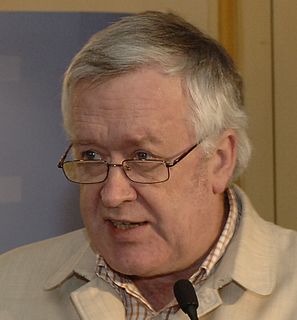A Quote by Ross Gelbspan
The largest source of greenhouse gases in the coming decades will not be the US, Western Europe and Japan, but the developing economies of East Asia, Latin America and Eastern Europe. The coming eruption of carbon emissions from the poor world will dwarf any reductions in the North.
Related Quotes
In conversations and visits with friends from Africa, Asia, Latin America, the Middle East, and Eastern Europe I am often struck by the gaps in our Western theological approaches. The most common texts used in evangelical schools have been written in the US, UK, and Australia. However, they miss some fundamental contextual issues.
I think that in this globalised world, the local is going to become more and more important - it is a paradox. You see it in Western Europe more and more. Eastern Europe is still coming out of the Soviet uniform cultural era, but this kind of separation and nationalism is very obvious now in Western Europe.
There will be a shifting of the poles. There will be upheavals in the Arctic and the Antarctic that will make fotr the eruption of volcanos in the Torrid areas... The upper portion of Europe will be changed in the blink of an eye. The earth will be broken up in the western portion of America. The greater portion of Japan must go into the sea.
Europe is being subjected to the kinds of programs that devastated Latin America for many years. Latin America has thrown them out and is pulling out: It's successful; it's democratizing; it's economically developing; and it's free from the shrapnel of US imperialism for 25 years. Meanwhile, Western Europe is destroying itself systematically, destroying itself going in the opposite direction.
The fast growing markets - the BRICS and Next Eleven - are the key. The next billion consumers are not going to come from the US or Western Europe - they are coming from Asia, Latin America and Africa. Formula One follows our strategy: fast growing markets, data, and digital. All those three things Formula One has. And it involves a stunning array of companies. Now that doesn't mean there can't be more.
Industrialized countries have disproportionately more cancers than countries with little or no industry (after adjusting for age and population size). One half of all the world's cancers occur in people living in industrialized countries, even though we are only one-fifth of the world's population. Closely tracking industrialization are breast cancer rates, which are highest in North America and northern Europe, intermediate in southern Europe and Latin America, and lowest in Asia and Africa.
Autumn is much redder in North America and east Asia than it is in northern Europe, and this can't be explained by temperature differences alone. These areas also have a greater proportion of ancient tree lineages surviving: trees have gone extinct at a higher rate in Europe compared with those other areas.
I think that once people understand the great risks that climate change poses, they will naturally want to choose products and services that cause little or no emissions of greenhouse gases, which means 'low-carbon consumption.' This will apply across the board, including electricity, heating, transport and food.






































